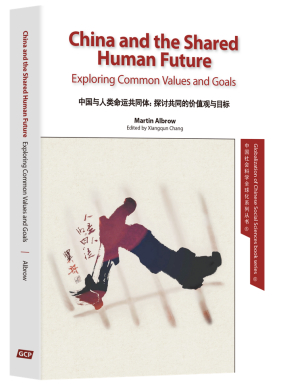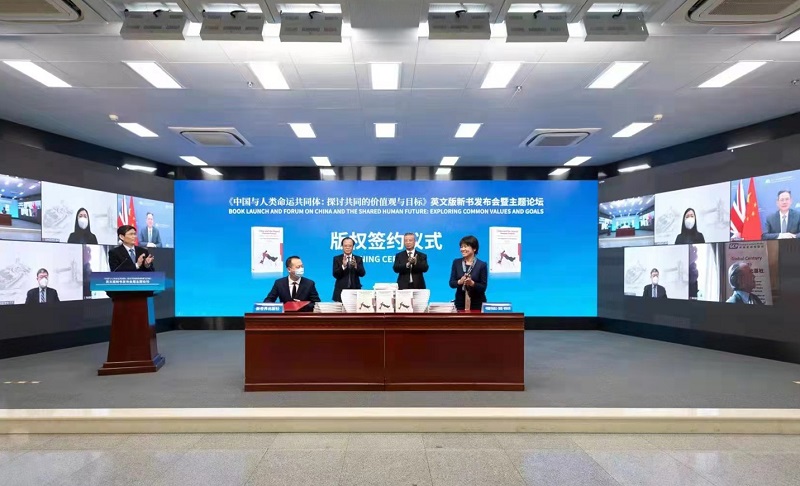British sociologist Martin Albrow’s latest book -- China and the Shared Human Future: Exploring Common Values and Goals -- was launched in Beijing on April 6. It coincided with the London Book Fair 2022 held from April 5 to 7 to reunite the publishing community with three days of business, networking and learning. Following the book launch, a forum on the same theme was held simultaneously in Beijing and London, both offline and online, attended by over 100 experts and scholars from home and abroad.
The Chinese Ambassador to the U.K., Zheng Zeguang, pointed out that this year marks the 50th anniversary of the establishment of diplomatic relations between China and the U.K. at the ambassadorial level. “Now, the two sides are standing at a new historical starting point. We need to take a strategic and long-term perspective, uphold mutual respect, keep an open and inclusive mindset, increase dialogue and exchange, and expand mutually beneficial cooperation,” he stressed.
The vision of a community with a shared future was in line with the fundamental interests of the whole world, and showed the right direction for the development of globalization. “It has won recognition and support from more and more countries and peoples. And this could not have been achieved without the continuous and persistent study, exploration and promotion by visionary people like Professor Albrow,” Ambassador Zheng said.

The Chinese Ambassador to the U.K., Zheng Zeguang, speaks at the launch of Martin Albrow’s new book China and the Shared Human Future: Exploring Common Values and Goals in Beijing on April 6.
Albrow, founding honorary president of the Global China Academy, is one of the foremost sociologists in the English-speaking world and one of the greatest experts on globalization. His previous book China’s Role in a Shared Human Future: Towards Theory for Global Leadership, explores China’s readiness to assume a global leadership role.
The new book, he said, was inspired by the rise of China as a key actor in world events. It aims to emphasize the talent of the Chinese in balancing commitment to values with setting goals that match the unique circumstances of any moment in time.
The book is divided into three parts: Theoretical Exploration, Practical Themes, and Globalization of Chinese Social Sciences. Part one contains the author’s views on a community with a shared future for mankind and a selection of his essential work on global studies. It lays a solid theoretical foundation for the book and gives it classic reading and collection value. Part two brings together work focused on global governance and China’s exploration, practice and experiences of governance, dating from the last decade of Albrow’s academic career. Part three presents examples of his attempts to explore the globalization of Chinese social sciences.

Martin Albrow’s new book
It is a remarkable job of shedding light on these extraordinary changes and on the pivotal role that China is likely to have in shaping further evolution. The nine chapters cover a wide range of topics, from building a community with a shared future for mankind to the theory and practice of globalization, global governance and China, the Belt and Road Initiative and China’s poverty alleviation. The fight against COVID-19, globalization, and Chinese practices are also comprehensively expounded.
“China, by virtue of its continuous history over millennia, by its population size and its economic progress is now obliged to be a truly global nation,” the author said, expressing the hope that the book could “add even the tiniest extra encouragement to China to realize its spirit as a truly global nation.”

The book launch in Beijing on April 6.
During the panel discussion that followed the launch ceremony, Martin Jacques, former senior fellow at the Department of Politics and International Studies at the University of Cambridge, indicated a striking difference between the U.S. and China: America is wedded to singularity and the exclusion of countries it perceives to be different and therefore, unacceptable. China, in comparison, is pluralist in its mentality.
“China’s starting point is tianxia, all under heaven, a world that is open to all and not defined by boundaries or discrimination,” he said. “The idea of a community of shared future for mankind draws on the concept of tianxia, of a world view rather than a concept of the world divided into over 190 nation states.”
Tony McEnery, council member of the Academy of Social Sciences, and founding fellow and chair of Global China Academy Council, had more to add. There are many things that human beings are currently experiencing together, and will continue to face together in the future, such as climate change, he said. “Our future is shared, and the more we realize it and act towards a shared future, the better humanity will be.” Albrow’s book, he said, was “a constructive provocation, making us look at culture and human relations in a new way.”